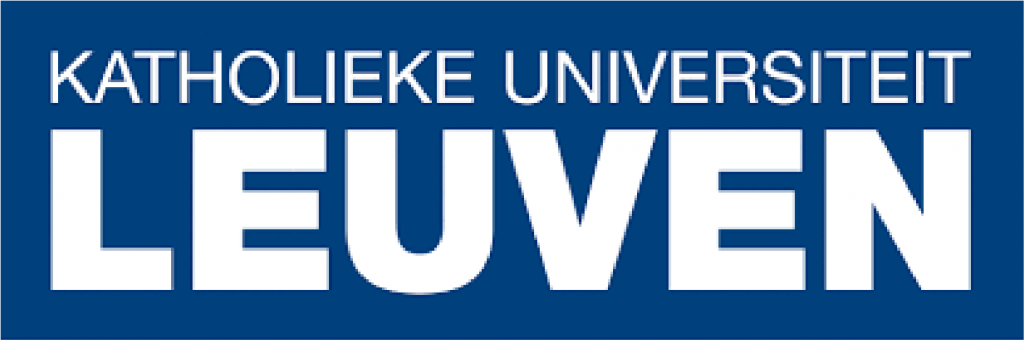16.00 Normal 0 false false false DE X-NONE X-NONE /* Style Definitions */ table.MsoNormalTable {mso-style-name:"Normale Tabelle"; mso-tstyle-rowband-size:0; mso-tstyle-colband-size:0; mso-style-noshow:yes; mso-style-priority:99; mso-style-parent:""; mso-padding-alt:0cm 5.4pt 0cm 5.4pt; mso-para-margin-top:0cm; mso-para-margin-right:0cm; mso-para-margin-bottom:8.0pt; mso-para-margin-left:0cm; line-height:107%; mso-pagination:widow-orphan; font-size:11.0pt; font-family:"Calibri",sans-serif; mso-ascii-font-family:Calibri; mso-ascii-theme-font:minor-latin; mso-hansi-font-family:Calibri; mso-hansi-theme-font:minor-latin; mso-bidi-font-family:"Times New Roman"; mso-bidi-theme-font:minor-bidi; mso-ansi-language:DE; mso-fareast-language:EN-US;}
International Stakeholders Connect in Nordstadt
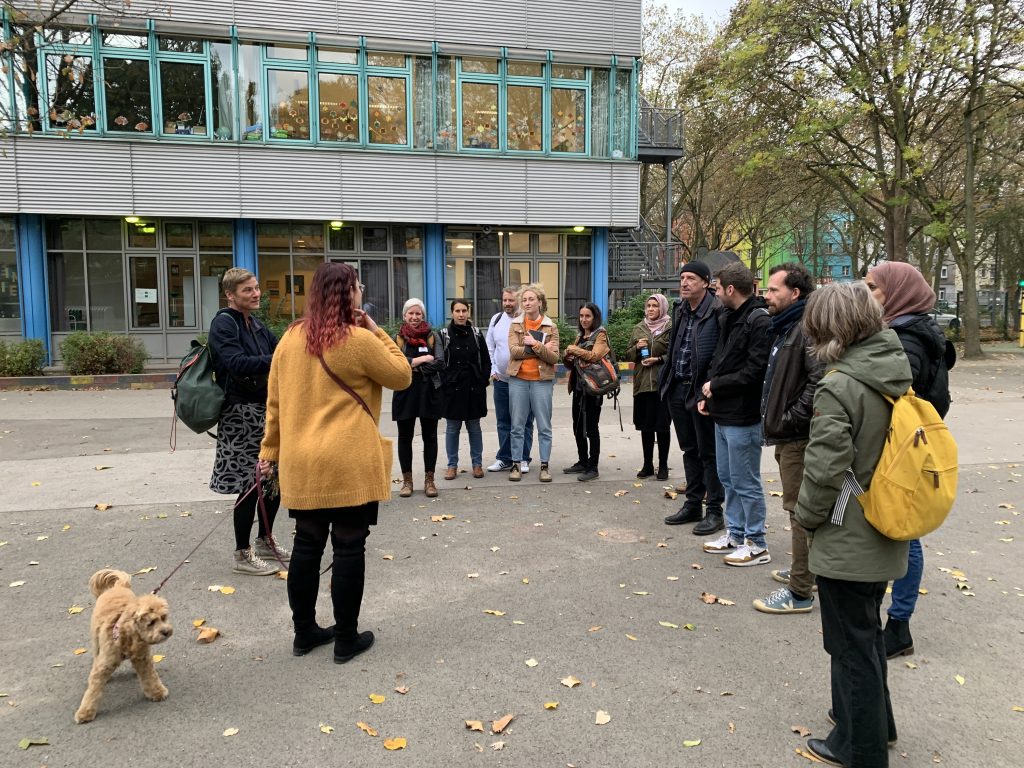
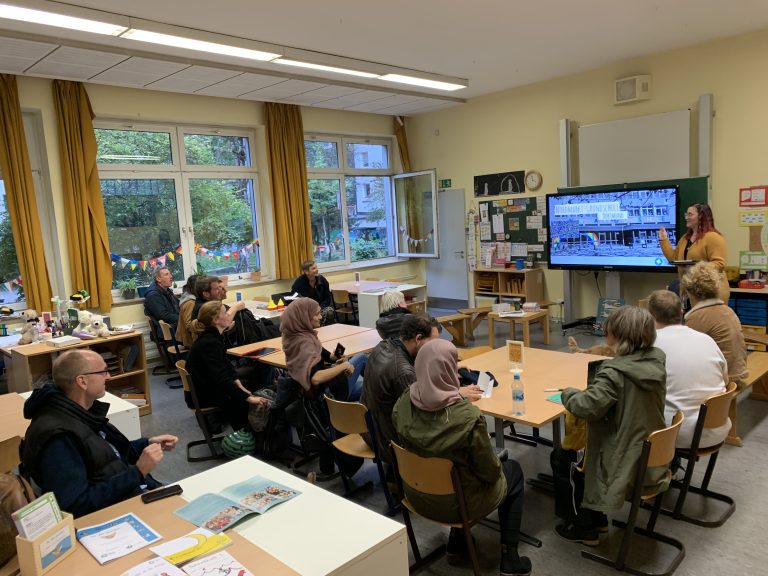
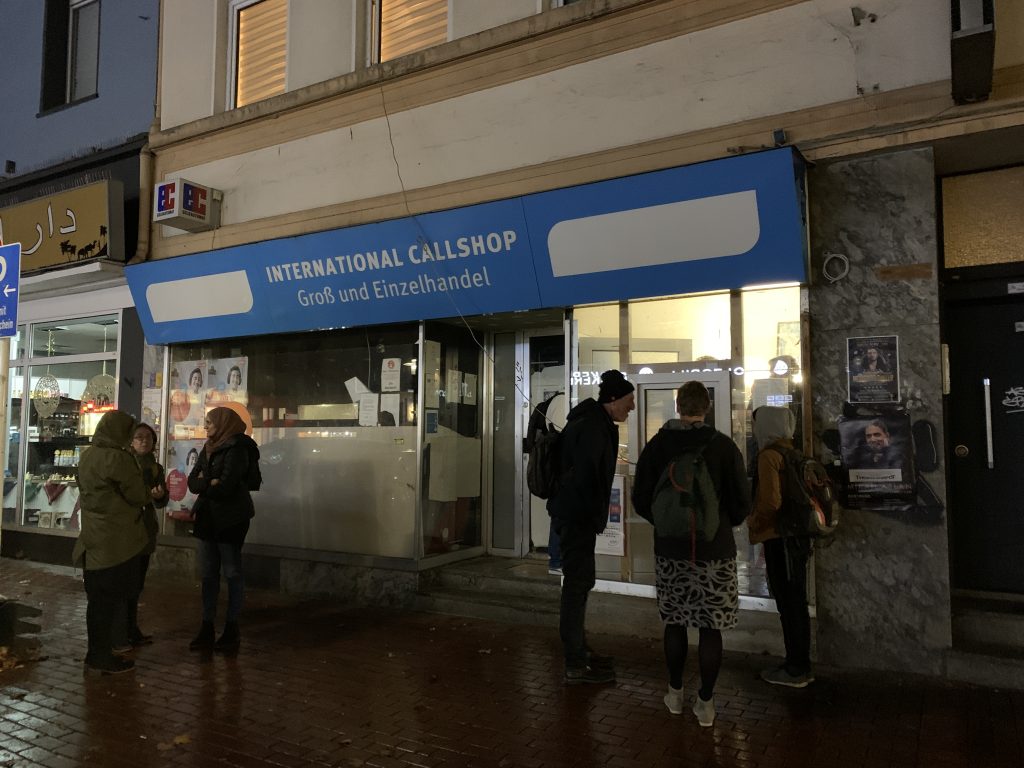
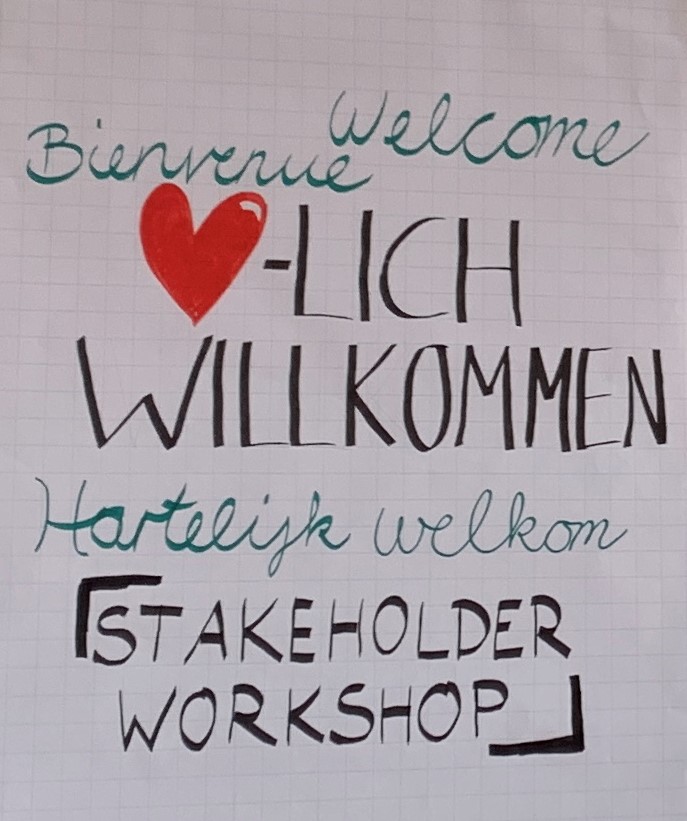
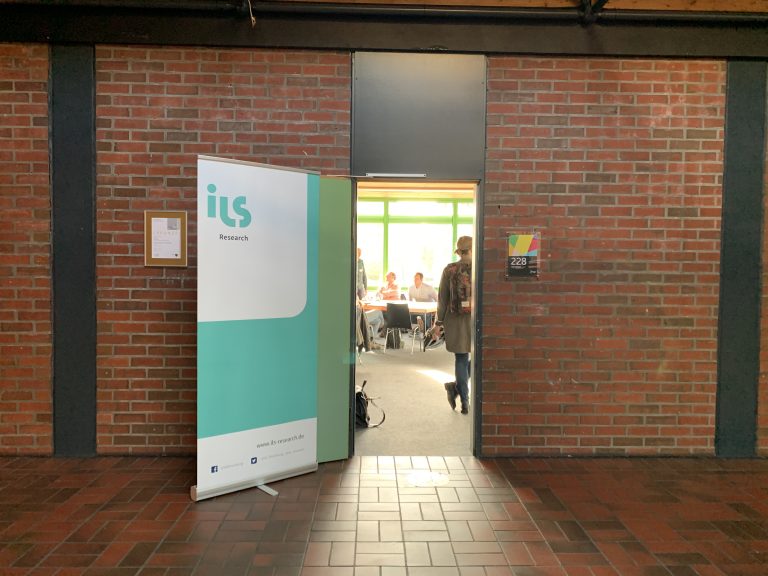
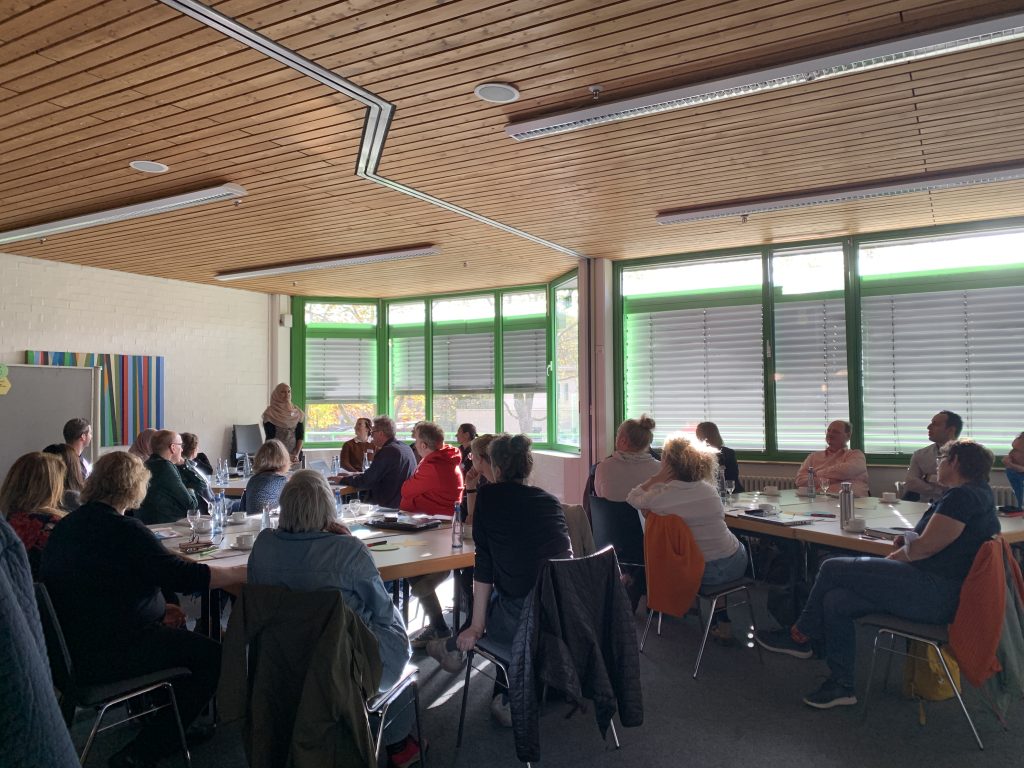
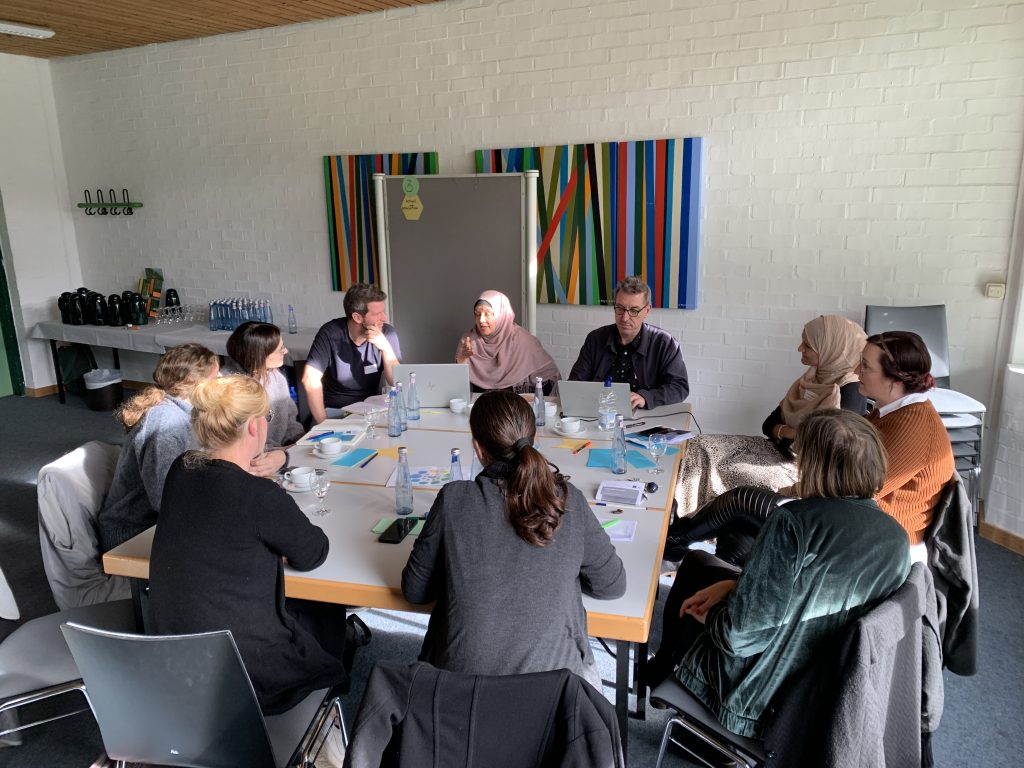
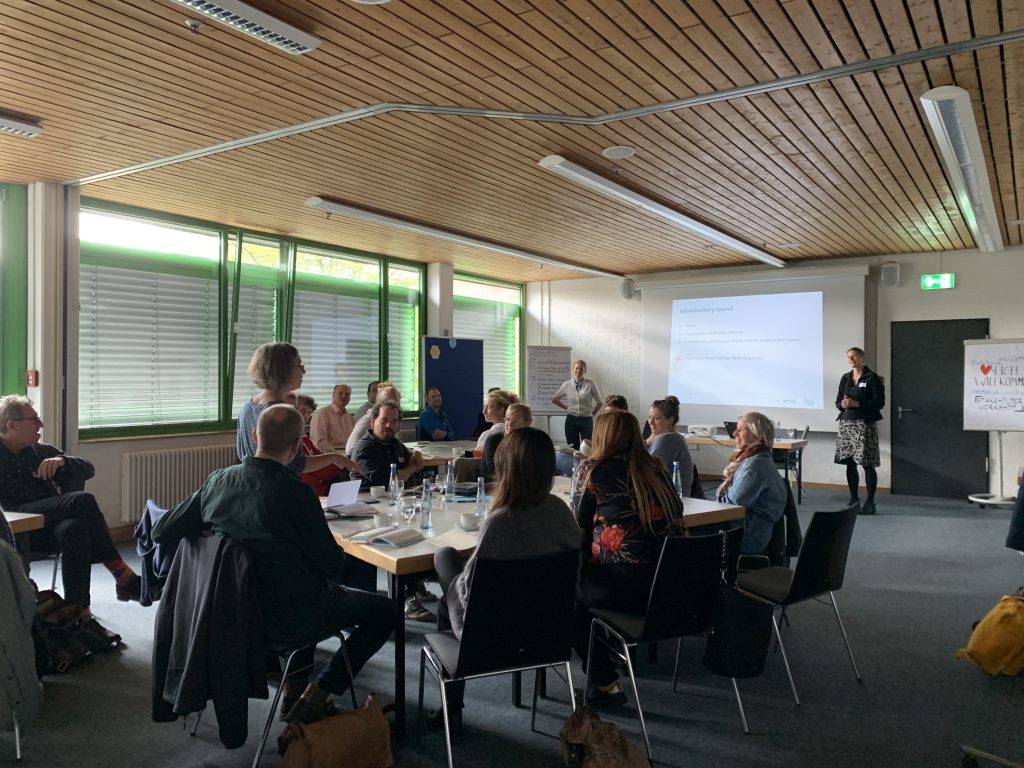
At the beginning of November 2022, the AIMEC team met in Dortmund to connect practitioners who support migrants in London, Brussels and Dortmund. Over two days, the participants exchanged experiences, shared practices of supporting newcomers and identified differences between the three sites. In this blog, we report on our most important takeaways.
It was an autumnal November day when we started our visit. The project team was accompanied by experienced practitioners from Newham (London) and Cureghem (Brussels): Beverley Mohiuddin from the Renewal Programme and Soofia Amin from Kensington Primary School in London, and Kaatje Roelant and Vital Marage from the Prevention Service of the Municipality of Anderlecht in Brussels. Despite the slightly rainy weather, we went on a tour through Dortmund Nordstadt to get to know and connect with different arrival spaces. These included organisations that support migrants, a school where most pupils do not have German as their first language, and a migrant-run shop supporting newcomers. We were welcomed by a variety of organisations on their premises, including: Raum vor Ort, Primary School Nordmarkt, Willkommen Europa, Grünbau and Train of Hope. Visiting these organisations and talking to practitioners working in them led to many interesting conversations about the similarities and differences between migrant support initiatives across the sites. We continued these conversations on the second day during a workshop with stakeholders from other organisations and institutions, such as the employment agency, the social department of the city council and other actors that have also participated in a first AIMEC workshop. We discussed the following three key themes relating to challenges and good practices for supporting newcomers.
Precarity and Arrival
While not all arrival situations are precarious, in all three sites, large parts of the population are newcomers who are affected by poverty and precarity. During the workshop, we discussed the intersection of migration and precarity that we can observe in all three sites, despite different legal and governmental structures. Precarious arrival situations result from de jure and de facto exclusions. On the one hand, people without documents or with a certain nationality or migration status face juridical exclusions ranging from the right to stay to the right to work or to access welfare benefits. On the other, newcomers face language and bureaucracy barriers and are often unaware of important rights, entitlements and support structures. In addition, they are often confronted with discrimination and insufficient infrastructure, for example when it comes to accommodation for refugees (Brussels and London) or locally available school places and paediatricians (Dortmund). The stakeholders who participated respond to these exclusions on many levels. They not only provide support to overcome these barriers and fill provision gaps, but also work strategically towards legal and institutional changes. This also includes tackling precarious working conditions within the migrant-support sector, and fighting for recognition and better structural funding of the important arrival-related support undertaken in arrival areas.
Mediators as the Link Between Institutions and Newcomers
In our research and conversations during the workshop, it became clear that mediating figures play a crucial role in connecting newcomers to services, institutions and – more broadly – resources. ‘Handholding’ was a recurring theme in our conversations. Beyond simply being signposted to other organisations or council services, many newcomers need practical help to get to those destinations, to communicate when they arrive there, or be shown exactly where and how to register for a school place, health insurance, a council flat, etc. Mediators are crucial not only for newcomers but also for institutions and organisations. They often work informally, sometimes charging for their services, but often helping for free.
But there are also examples of more institutionalised mediators. Vital Marage, responsible for intercultural mediation and newcomers at the Prevention Service in Anderlecht, shared the experience of Brussels, where mediators with a migrant background are employed by the municipality. The municipality created mediation as a methodology and professional profile to facilitate links between migrants and council services. The mediators work in three social spaces: the municipal immigration office, the social welfare agency and schools. Practitioners in Dortmund share similar positive experiences with Roma mediators who work in primary schools, facilitate communication between families and school staff, and offer support beyond school-related issues.
But bureaucrats, teachers, service providers and others also take on mediating roles when working with newcomers. Their day-to-day work often goes well beyond their remit, in many cases in contexts of extremely scarce resources and under a lot of time pressure. Examples range from schoolteachers visiting families to encourage them to send children to school, to practitioners working many extra hours to help individuals find an apartment. Many practitioners emphasised how newcomers often arrive with multiple needs. The need for support goes beyond the initial period of arrival, and new challenges may emerge over time. Nora Oertel-Ribeiro, an educational officer at Nordstadt’s Raum vor Ort, highlighted the needed additional support for certain discriminated and vulnerable groups. Workshop participants also stressed the need to mainstream an “arrival-sensitivity”: service providers working with newcomers should be better able to communicate, understand needs and orientate their clients.
Asset-Based Learning in Schools
Schools are more than a place to learn the alphabet, especially in arrival neighbourhoods. They are important arrival spaces for children and families, particularly mothers. They do not only educate but also support newcomers with information and orientation, offer opportunities for social contact and networking, and often provide for basic needs such as food. Adult education centres play a similar role.
When considering how we can understand and support learning in arrival areas, London-based assistant head teacher Soofia Amin from the Kensington Primary School and English tutor Beverley Mohiuddin from the Renewal Programme made workshop participants rethink how to approach newcomers who do not speak the majority language(s): instead of focusing on their deficit in majority language skills, schools should see their existing language skills as assets. Kensington primary school follows an approach that celebrates multilingualism, for example with after school language clubs (Spanish, Romanian, etc.) that are open to all pupils. Examples such as the Newham Renewal Programme or Raum vor Ort in Nordstadt show that in the field of adult education, newcomers can even co-create curricula according to their skills and interests.
But the ability of an institution to adapt to its learners’ knowledge and needs varies according to the institutional setting and its funding. Workshop participants from all three sites shared the experience that primary schools in particular lack financial resources, staff and school places. Schools often have to reject new pupils and do not have sufficient resources to address the needs of newcomer students.
Arrival Infrastructures – What Stakeholders Took Away
The visitors were struck by the density of migrant support organisations in Nordstadt and how well organisations are connected with each other and with the local council. They are thus able to signpost newcomers to those organisations or council services which can best provide the support they need. There is also a great degree of professionalism in support provision in Dortmund: organisations’ staff are often highly qualified in the field of social work. Yet organisations are also less accessible for workers with a migration background. Whereas in London, for example, we see many people with a migration background working in civil society organisations, this is less so in Dortmund. The expectation of formalised professionalism via college and university degrees may create barriers and disadvantages for migrant employees. Another challenge relates to how best to address different needs. In London and Brussels, support is more mainstreamed and less targeted at migrants or newcomers than in Dortmund, where many targeted support services for specific groups exist.
All in all, researchers and practitioners alike were struck by the many similarities and shared challenges, but also the different approaches and structures in the three sites. Soofia Amin from London said that she “was truly blown away by the experience and had lots of observations to take back and share. To see the way new arrivals are welcomed in Dortmund, the school approach, the community-based educational and social support, all of this has helped me see how similar the challenges are but also how the approach varies between Dortmund and Newham.” Some participants emphasised how this workshop created the time and space for strategic thinking that they rarely have during their day-to-day work. Kaatje Roelant from Brussel-Anderlecht’s Prevention service found it particularly useful to “take a step back from being on the field and to reflect on what we see on a daily basis.“ The exchange uncovered a variety of topics for future exchange and research. Frank Merkel, head of the migration and integration service of Dortmund’s Caritas pointed out the importance of translocal and transdisciplinary exchange: “It is not only pleasant and interesting, but it becomes more and more necessary in order to adequately address the growing issue of migration.” We agree and look forward to staying in touch in the further course of the AIMEC project. Thanks to everyone who participated!
For more information (in German) see: https://www.ils-forschung.de/2022/11/pressemitteilung-integration-dortmund-kann-international-mithalten/




